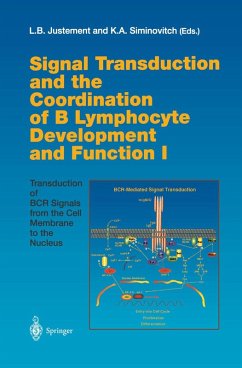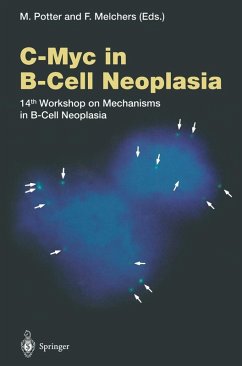
c-Myc Function in Neoplasia (eBook, PDF)

PAYBACK Punkte
37 °P sammeln!
1. 1 SCOPE OF BOOK n explosion of novel findings in the past decade has contrib A uted to the great progress toward understanding the biology of human cancers. Much of this progress can be attributed to our abil ity to dissect many biological processes at the molecular level. Most spectacular is the technology of molecular biology that allows identi fication and characterization of genes that participate in the genesis of human cancers. Three major groups of genes appear to play out the drama of cancer development: tumor suppressor genes, mis match repair genes, and oncogenes. The tumor suppre...
1. 1 SCOPE OF BOOK n explosion of novel findings in the past decade has contrib A uted to the great progress toward understanding the biology of human cancers. Much of this progress can be attributed to our abil ity to dissect many biological processes at the molecular level. Most spectacular is the technology of molecular biology that allows identi fication and characterization of genes that participate in the genesis of human cancers. Three major groups of genes appear to play out the drama of cancer development: tumor suppressor genes, mis match repair genes, and oncogenes. The tumor suppressor genes 1 encode products that are inhibitory to cell proliferation. The loss of these inhibitors, by mutation or deletion, can unleash cells from their restraints to proliferate. Mutations in the mismatch repair 2 10 genes also have been implicated in tumorigenesis. - The inability of cells to repair spontaneously occurring mutations leads to genom ic instability and could potentially result in the accumulation of car cinogenic DNA lesions. Finally, activation of proto-oncogenes, which are normal cellular genes, into oncogenes could accelerate the 11 processes of cell proliferation. c-myc was one of the very first proto oncogenes to be identified and because it normally plays pivotal roles in both cell proliferation and cell death has enticed many to investigate the molecular mechanisms by which it transforms cells.
Dieser Download kann aus rechtlichen Gründen nur mit Rechnungsadresse in A, B, BG, CY, CZ, D, DK, EW, E, FIN, F, GR, HR, H, IRL, I, LT, L, LR, M, NL, PL, P, R, S, SLO, SK ausgeliefert werden.












